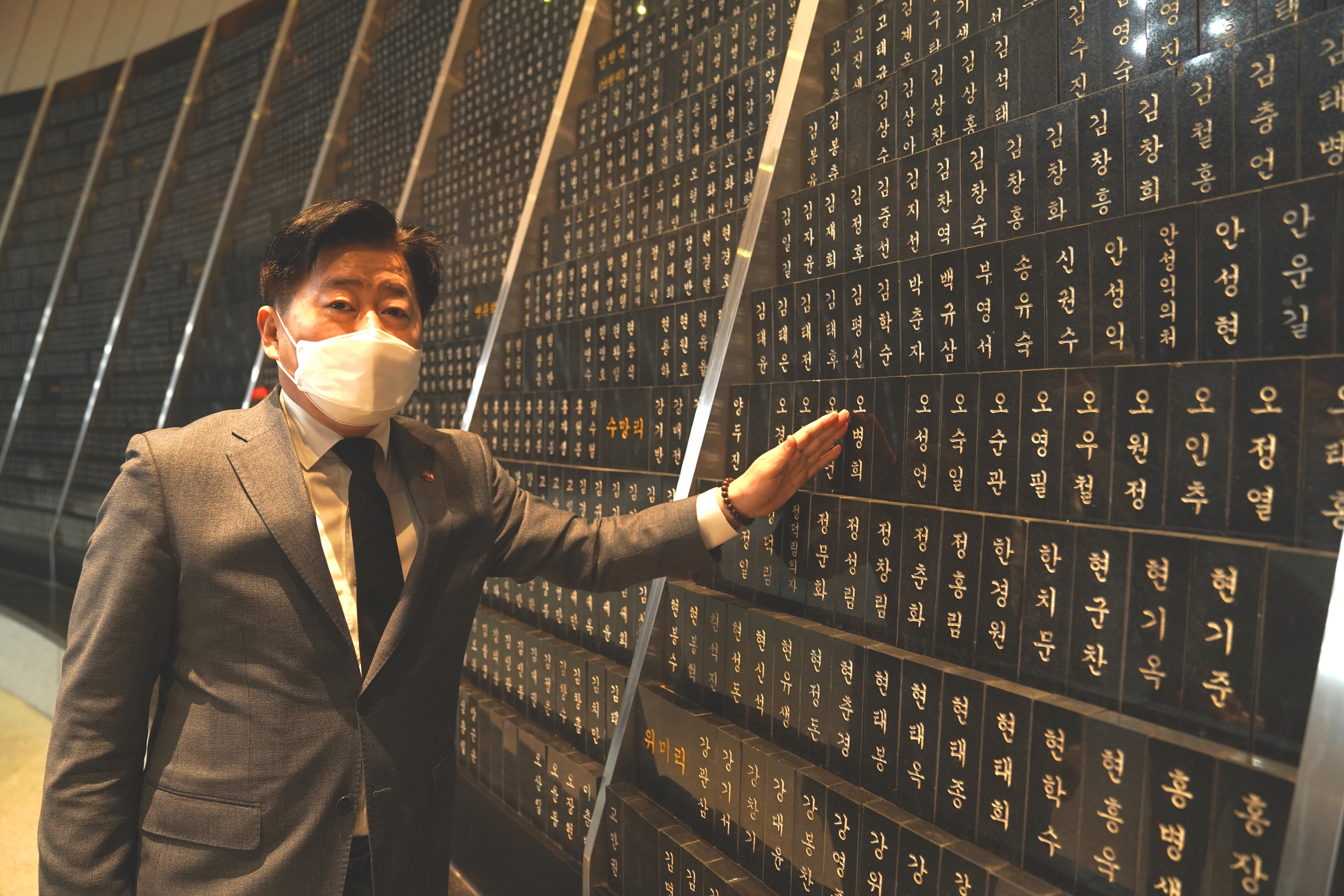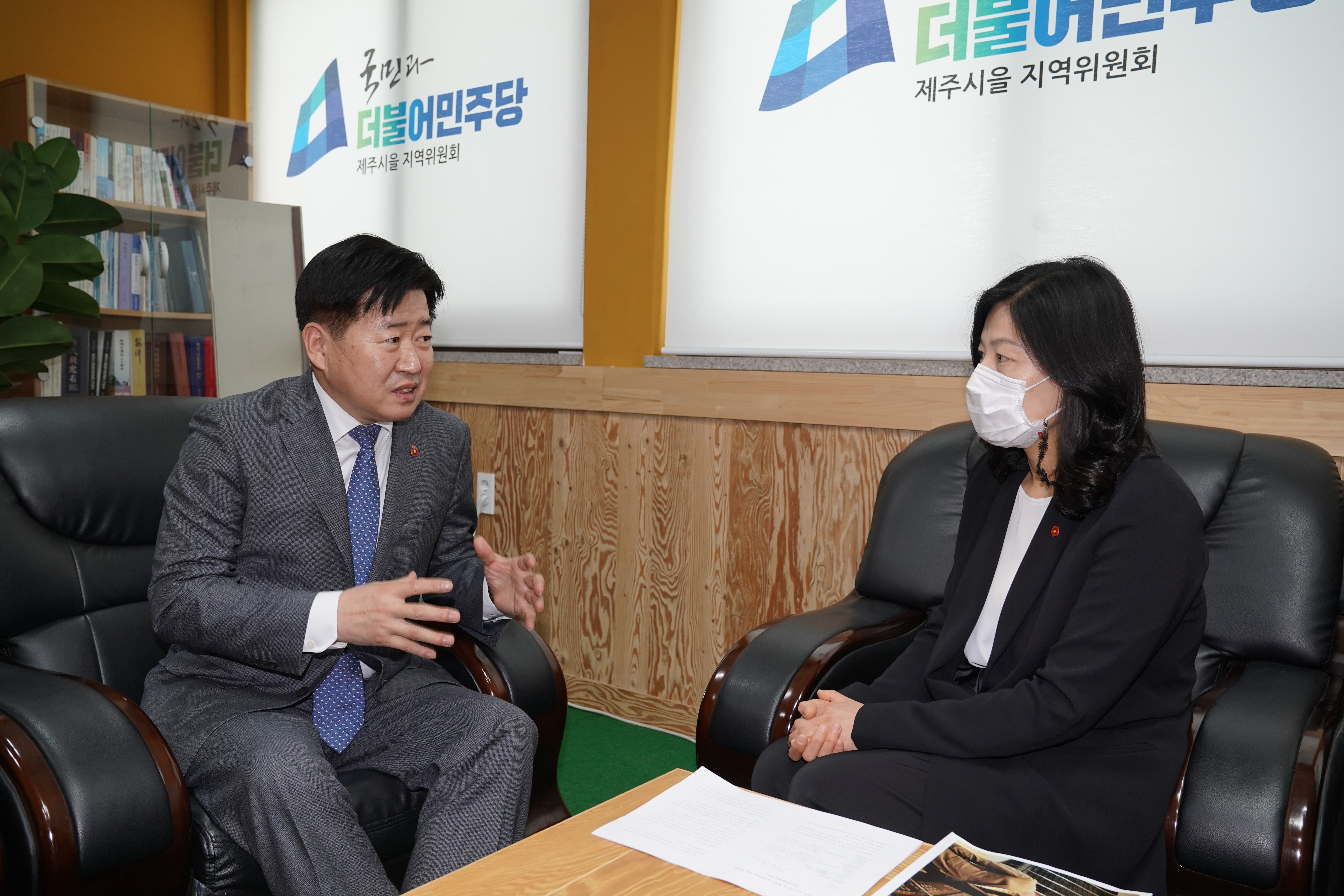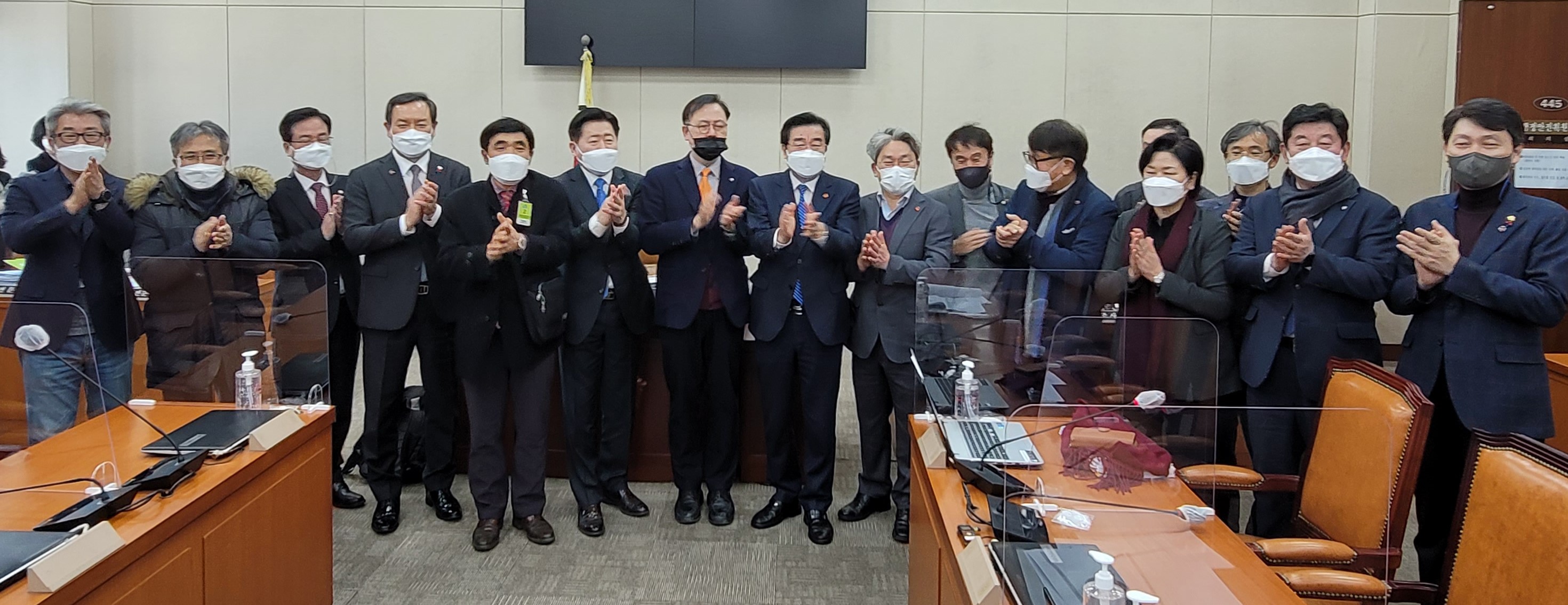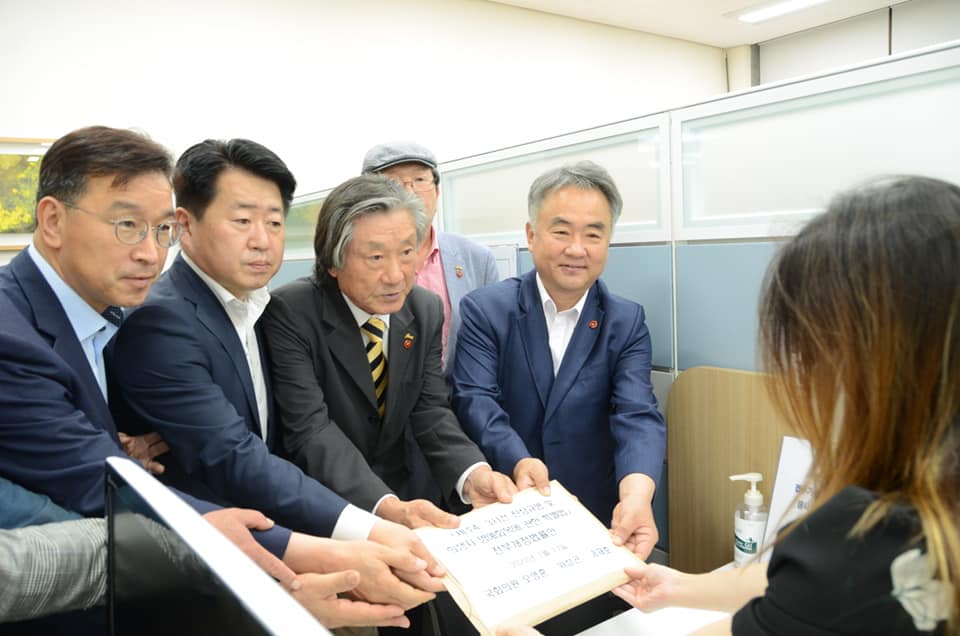“Jeju 4∙3 Special Act revised, the ‘big mountain’ now passed”
Interview with Rep. Oh Young-hun
 Rep. Oh Young-hun visits the Memorial Altar at the Jeju 4∙3 Peace Park shortly after the revised Jeju 4∙3 Special Act was passed. Oh describes his impressions about the passage of the bill in front of the memorial tablets of his great-grandfather Oh Won-jeong and his grandfather Oh Byeong-hee. (Feb. 27, 2021)
Rep. Oh Young-hun visits the Memorial Altar at the Jeju 4∙3 Peace Park shortly after the revised Jeju 4∙3 Special Act was passed. Oh describes his impressions about the passage of the bill in front of the memorial tablets of his great-grandfather Oh Won-jeong and his grandfather Oh Byeong-hee. (Feb. 27, 2021)
Rep. Oh Young-hun (Jeju-si B Constituency) was born in 1968 in Seogwipo City and graduated from Jeju National University’s Graduate School of Business. He also held the posts of the university’s Student Union president, the secretary-general of the Jeju People’s Solidarity for Discovering the Truth of Jeju 4∙3 and the youth committee chairman of the Association of the Bereaved Families of the Jeju 4∙3 Victims. In 2006 and 2010, he was elected as a member of the Jeju Special Self-Governing Provincial Council. After being elected to the National Assembly in 2016, Oh took office as chairman of the Democratic Party of Korea’s Jeju Special Self-Governing Province branch. He is currently serving as chairman of the Democratic Party of Korea’s Jeju-si B Constituency branch, a member of the 21st Nation Assembly’s Public Administration and Security Committee in the first half of 2021, and the chief secretary of the Democratic Party of Korea.
Interview and arrangement by Cho Jeong-hee, director of Memorial Project Team
Interview took place at the Democratic Party of Korea’s Jeju-si B Constituency office
On Feb. 26, the National Assembly’s plenary session finally passed the bill on the revision of the Jeju 4∙3 Special Act, a long-cherished desire of the Jeju people, especially the bereaved families of the Jeju 4∙3 victims. The passage of the bill was a splendid feat accomplished 21 years after the bipartisan Special Act on Discovering the Truth of Jeju 4∙3 and Restoring Honor to the Victims (hereinafter called the “Special Act”) was enacted in 2000. The content of the revised bill calls for further progress to be made to restore the honor to the victims of Jeju 4∙3 and settle past events. Specifically, the revised Jeju 4∙3 Special Act details the payment of compensation for the victims and restoration of honor to those wrongfully convicted as well as for the correction of inaccurate Family Relation Registers of the victims and the launch of additional investigations. The process by which this inspiring result was produced was long and full of extreme difficulties, such as the lengthy discussions between the ruling party, the government, and the presidential office as well as the fierce debates between the ruling and the opposition parties. However, Rep. Oh Young-hun, who proposed the motion, deserves to be named as the man most responsible for bringing about this victory despite all the hardships. Jeju 4∙3 and Peace met with Rep. Oh to listen to his description of the urgency and the tension surrounding the passage of the bill.
The motion on the general amendment of the Jeju 4∙3 Special Act was first proposed in December 2017 by the 20th National Assembly but was eventually scrapped. The bill would finally be passed by the 21st National Assembly. You must have had lots of inner struggles in the three-year-long course. What do you think about the recent accomplishment?
It is my impression that we still have a long way to go until Jeju 4∙3 has been completely resolved. And yet, I think the recent passage of the general revision bill did lay the groundwork for the complete resolution. When it passed, I thought, “We did it, finally!” and I was so happy that I almost forgot the difficulties we had to bear in the process.
Bereaved family members of the victims visited lawmakers countless times to demand for the bill to be passed, while Seoul-based bereaved families staged picketing protests in front of the National Assembly. Local government councils across the nation also adopted resolutions to urge for the passing of the revised motion. The Jeju District Court even held retrials and acquitted the Jeju 4∙3-related convicts of their false charges. It is my belief that the energy gathered from these efforts led to the triumphant passage of the bill of today.
The issue of compensation and indemnification for the victims at the national level was the hardest to resolve, and Rep. Lee Nak-yeon, the leader of the Democratic Party of Korea, played an important role in this matter. I’d like to take this interview as an opportunity to express my most sincere gratitude to Rep. Lee for tabling the bill four times during the high-level government meetings.
What was the most difficult moment in the process of revising the Jeju 4∙3 Special Act?
Since the motion was proposed as a general revision of the act, it involved different national authorities, including the Ministry of Strategy and Finance, the Ministry of Public Administration and Security, the Ministry of Justice, and the Supreme Court. Coordinating each statutory provision was extremely difficult. It felt like summiting a mountain every time we reached consensus about relevant clauses. The consultation with the Ministry of Justice ended up in the agreement on the ex officio retrial of approximately 2,530 convicts from the 4∙3-related courts-martial and the special retrial of over 1,300 convicts from general trials. At the moment, I felt that this time our effort would finally pay off.
The most difficult part was to achieve consensus with the Ministry of Strategy and Finance. I grew fretful in all of the four high-level meetings with the ruling party, the government, and the presidential office. When we finally broke the deadlock, I could sense that it was possible not just because we had made efforts but also because the souls of the deceased Jeju 4∙3 victims had strongly protected and supported us.

Rep. Oh describes the passing of the revised Jeju 4∙3 Special Act during an interview with Cho Jeong-hee, director of the Memorial Team. (Feb. 27, 2021)
It has been highly appraised that the ruling and the opposition parties sought consensus to pass the revised bill. What do you think was the driving force that persuaded the opposition party members in passing the bill?
In the 20th National Assembly, the revised bill was first proposed, leading to three separate discussions at the relevant Subcommittee on Legislation. However, the motion was rejected in the end. When starting my term in the 21st National Assembly, I was determined to visit the parliamentary Public Administration and Security Committee not just as a lawmaker but as a victim’s bereaved family member who desperately desired for the revision to be passed. I set out on this task, thinking, “If I don’t do this now, no one else would ever be able to do it. This is our last chance.” Fortunately, such a mental attitude resulted in a fruitful outcome.
The 21st National Assembly held one public hearing (Nov. 12, 2020), three discussions at the Subcommittee on Legislation (Nov. 17, 2020; Nov. 18, 2020; Feb. 8, 2021), followed by the passing of the bill on Feb. 18 of this year by the plenary of the Public Administration and Security Committee. During the 21st parliamentary election, opposition party candidates also made pledges to vote in favor of the bill. It was their response to the call from the victims’ bereaved families and other Jeju local communities. Jeju Governor Won Heeryong and lawmaker Lee Myeong-soo have also been a big help, and I’d like to take this opportunity to extend my gratitude to their support.
What are the key issues addressed in the general revision of the Jeju 4∙3 Special Act?
The latest revision of the Jeju 4∙3 Special Act will make at least four changes, from a broad perspective.
First, it laid the statutory groundwork to compensate victims for damages caused by state power. The revised bill will have to go through six months of outsourced research for complementary legislative work. Second, the act will now fully activate measures to restore the honor to nearly 2,530 convicts from the courts-martial and 1,300-plus convicts from general trials. Third, additional investigations on Jeju 4∙3 will be officially deliberated and put up for a vote at a parliamentary committee involving both the ruling and the opposition parties. Fourth, the revised bill will enable an en bloc organization of the statutory issues concerning the more than 3,500 people who went missing due to Jeju 4∙3.
Additionally, the bill created a special case clause to correct the inaccurate Family Relation Registers of some victims by demanding affiliation. The revised act also clarifies the duties of the state to provide support for the restoration of the local community, while stipulating the grounds for promoting projects to heal the post-traumatic disorders related to Jeju 4∙3.
What are the specific issues in the clause concerning the restoration of honor to the wrongfully convicted?
A special clause has been newly created as a measure to restore honor to those who were unlawfully convicted due to Jeju 4∙3. First, it has now become possible to request the ex officio opening of the en bloc retrial procedures for collective cases concerning those convicted by courts-martial. Another special clause also stipulates the requirements to conduct retrials for those convicted during general trials, enabling an individual claim to be filed to clear their charges. I think these are the key significant issues addressed in the new clauses.
What are the specific issues in the clause concerning the payment of compensation and indemnification to victims?
I found this to be the hardest part to reach consensus on with the government. Ultimately, the reality is that compensation is the only remaining way to console the victims and pacify the pent-up anger and sorrow of their bereaved families, which is truly regretful. Still, I hope it will be understood as a means to take full responsibility for the state violence that created so many innocent victims.
The recent revision prepared the legal grounds for compensation and indemnification, mandating national authorities to actively devise compensation schemes and other support measures for those who have been identified as 4∙3 victims. Under the new clause, the Ministry of Public Administration and Security, the national authority in charge of such tasks, will commission external agencies to conduct a six-month research endeavor to determine the appropriate amount of indemnity and develop the payment procedures and criteria. Consensus has been reached with the ruling party, the government, and the presidential office to enable the indemnification process to start in 2022 when the statute is complemented based on the research findings.
 Officials from the Association of the Bereaved Families of the Jeju 4∙3 Victims, the Jeju 4∙3 Peace Foundation, and the Jeju Special Self-Governing Provincial Council greet the passing of the revised bill on the Jeju 4∙3 Special Act with applause. (Feb. 8, 2021)
Officials from the Association of the Bereaved Families of the Jeju 4∙3 Victims, the Jeju 4∙3 Peace Foundation, and the Jeju Special Self-Governing Provincial Council greet the passing of the revised bill on the Jeju 4∙3 Special Act with applause. (Feb. 8, 2021)
What are the specific issues detailed in the clause concerning the launch of additional investigations?
With regard to this clause, there was an issue surrounding the different opinions between the Ministry of Public Administration and Security and the opposition parties. The existing investigation report was published by the government after the original Jeju 4∙3 Special Act was enacted in 1999. The investigation report has since formed the basis of the subsequent announcement of presidential apologies, the designation of April 3 as an official memorial day, and the identification of the victims and their bereaved families. Later in 2007, the act was revised to impose the role of conducting additional investigations to the Jeju 4∙3 Peace Foundation, which published the first volume of the additional investigation report in 2019.
Jeju 4∙3 involves intricate issues that took place not just during the uprising and massacre, but also before and after the formation of the South Korean government as well as the ensuing Korean War. Since it spans across a long period from 1947 to 1954, the victims’ damages feature different aspects. This is why there has been a strong need to continue investigations in an effort to engrave Baekbi [a memorial monument laid without an epitaph on the ground] with the proper name for the tragedy that happened here. Given the colossal scale of the currently identified victims tallied at 14,533 people, there is also a growing demand for supplementary probes into the victims’ individual damages. Difficulties arose in negotiating about these issues because the Ministry of Public Administration and Security, the competent authority, judged that the matter would be able to be handled by the Jeju 4∙3 Peace Foundation, while some opposition party lawmakers called for an investigation at the national committee level.
Eventually, the additional investigation issue has been added to matters that require deliberation and determination by the Committee on Discovering the Truth of Jeju 4∙3 and Restoring Honor to the Victims (hereinafter called “the Committee”). And the Committee will accept four more members recommended by the National Assembly, who will also obtain membership of the Committee’s subcommittee, which will be formed to address relevant issues. On top of that, a new clause now stipulates that the Committee chairman shall appoint one of those members recommended by the National Assembly as the subcommittee chairman. Lastly, it has been defined that the Jeju 4∙3 Peace Foundation will conduct the additional investigations as per determined by the Committee, after which the findings shall be developed and published in a report to be submitted to the National Assembly.
 Song Seung-moon, former president of the Association of the Bereaved Families of the Jeju 4∙3 Victims, and Jeju-based lawmakers, including Song Jae-ho, Oh Young-hun, and Wi Seong-gon, submit the proposal on the general revision of the Jeju 4∙3 Special Act (July 27, 2020).
Song Seung-moon, former president of the Association of the Bereaved Families of the Jeju 4∙3 Victims, and Jeju-based lawmakers, including Song Jae-ho, Oh Young-hun, and Wi Seong-gon, submit the proposal on the general revision of the Jeju 4∙3 Special Act (July 27, 2020).
Any other noteworthy clauses?
There occurred many heartbreaking cases of families being torn apart due to Jeju 4∙3, such as the cases of orphaned children whose names were incorrectly entered into the family registers of their relatives or even entirely unrelated families. Before the latest revision, the Jeju 4∙3 Special Act exhibited limited effectiveness in this regard because it allowed the family registers to be corrected only in the areas whose households had lost their registers during Jeju 4∙3. The revised bill has become more effective as it deleted the prerequisite of “having lost the family registers” and instead inserted the phrase, “resulting from the damage caused due to Jeju 4∙3.”
You have built a strong connection to Jeju 4∙3 ever since you were young. In 1993 when you served as chairman of the Jeju Regional College Student Council, you even submitted a written request for the formation of a Parliamentary special committee on Jeju 4∙3. What are the moments that you particularly remember?
My grandfather and great-grandfather were killed during Jeju 4∙3, and my grandmother had to raise my father all by herself. When I entered college, “Jeju 4∙3” had been a taboo word. I was immensely shocked to learn about the partial truth of Jeju 4∙3 during my undergraduate years. I could finally see that it was Jeju 4∙3 that my grandmother had fragmentarily recounted to me. That inspired me to walk the lifelong path toward discovering the truth of what happened during Jeju 4∙3 and clearing the names of the falsely accused victims.
It was 4∙3 that pushed me to join the student movement and serve as chairman of Jeju National University’s Student Union. While taking office, I believed that the task of revealing the truth of Jeju 4∙3 and restoring honor to the victims must be addressed in the political domain, particularly by the National Assembly. That is why I led the campaign of requesting the National Assembly to form a parliamentary committee on Jeju 4∙3. After all, it was Jeju 4∙3 that guided me to reach the center of politics.
On Feb. 8, lawmakers in the Subcommittee of Legislation of the National Assembly’s Public Administration and Security Committee broke the staunch deadlock by passing the revised motion. However, I heard that Feb. 8 was also the ancestral memorial day of your grandfather who died during Jeju 4.3.
For that reason, I had a strong feeling that the souls of the deceased Jeju 4∙3 victims helped us. As you mentioned, my grandfather had died on Feb. 8, which coincidentally coincided with the date of passing the bill. It felt as if he had been to pass the bill on his death day.
Finishing my schedule that day, I returned to Jeju and took a moment to pray for my grandparents, saying, “The revised Jeju 4∙3 Special Act has been finally passed to fully resolve all remaining issues. And it was all thanks to your care and support.”
What are the remaining procedures concerning the revision of the Jeju 4∙3 Special Act? Are there any further statutory supplements to be made?
On Feb. 26, the bill was finally passed at the National Assembly’s plenary session. The revised act will take into effect in three months, after preparing the related enforcement decree. Judging from the new clauses, the effectuation will lead to Committee-level efforts to request ex officio retrials for those wrongfully convicted during the courts-martial. Statutes will also be further elaborated on concerning the missing victims.
Currently, state-funded research institutes have undertaken research projects to determine the proper amounts of compensation and indemnity, as well as the payment criteria and procedures. When the commissioned research has been completed, the act will be equipped with supplementary statutes, hopefully before the parliamentary regular session begins in September. In parallel, I will work with other lawmakers to include the amounts of indemnity in the budget bill for the 2022 fiscal year. With these tasks smoothly executed, the indemnification process will be able to start in 2022. And I will always be taking care of each and every detail of the process. Thank you.